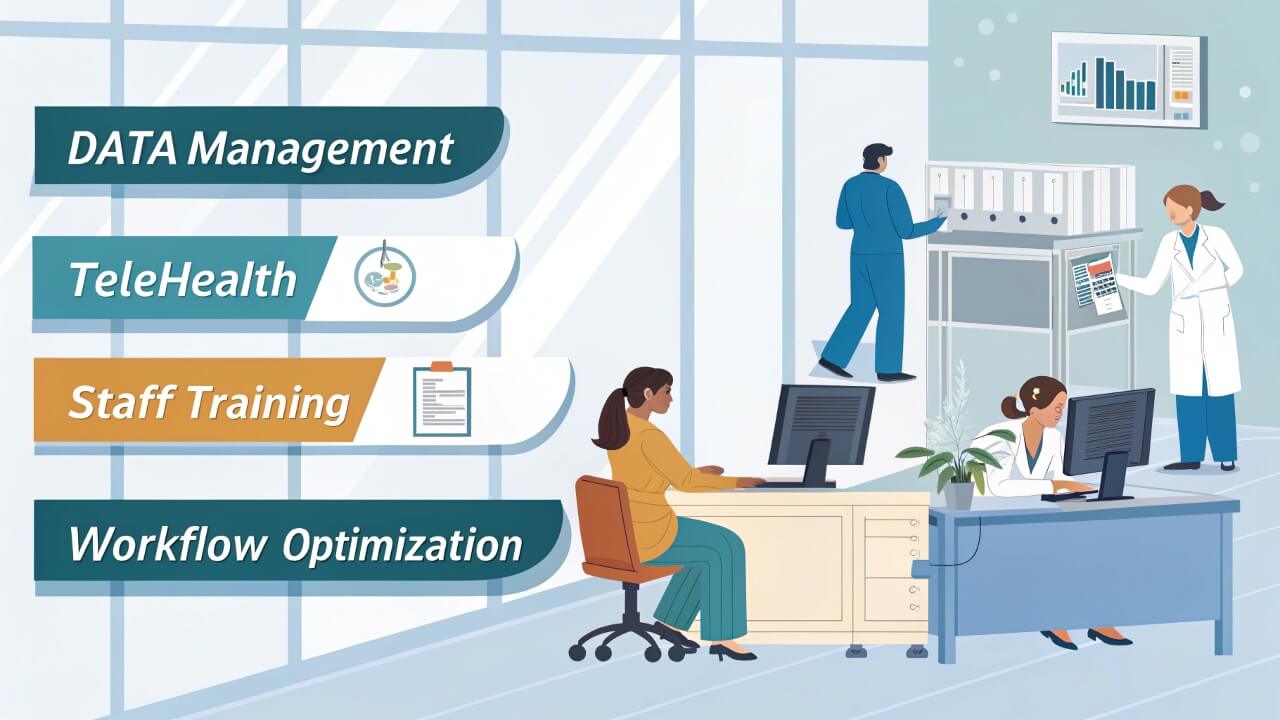What Strategies Can Boost Efficiency in Medical Practices?

If you are running a medical practice here in Australia, be it a bustling GP clinic in Sydney or a small, cosy family practice in regional Queensland, you will know the drill: long hours of work and endless paperwork, balancing patient satisfaction and Medicare compliance. However, what if I tell you there are simple ways to increase the efficiency of your clinic without merely allowing for the burnout of your team?
In this blog, we try to rationalise ways to enhance operationally, maximise your resources, and maintain standards of care. Let's get cracking—because who couldn't do with a little extra time for a weekend barbeque?
Technology Adoption for Smarter Operations
A fast track to improvement for any medical practice would include leaning heavily on technology to diminish grunt work on daily chores. Think of how much valuable time the administration staff probably spends chasing appointments or needing to sift through patient files. By embracing a strong patient management system, you can actually help by sending out automated appointment reminders, making appointment booking a breeze, and securely keeping all patient records in one location. This system is not just an electronic application but more to let the team be able to spend quality time interacting with patients.
To drive home a point, the software must go a couple of steps further, for example, incorporating additional functionality with My Health Record of Australia so that it can access patient histories instantly instead of engaging in the tiresome task of manual input. Clients who have unicast their systems have claimed a 30% reduction in admin times and that this means fewer mistakes and happier patients not forced into waiting time. Start small by looking into how you're currently set up, try a system for ease of use, and then train your staff on it bit by bit. The key is picking a system that has a scalable build, one that can grow with your practice; otherwise, you could be tied down to old methods that hinder you.
Streamlining Work Processes Through Minor Adjustments
On the other hand, efficiency is usually about giving a rethink to how your practice manages day-to-day operations. Take a patient flow analysis seriously—from when people enter the door to when they leave with their script in hand. These stepwise breakdowns reveal bottlenecks such as double-booking or redundant paper trails that clog up the systems.
An elegant solution is to put in place triage protocols that better align with Australian guidelines whereby nurses triage for non-acute cases, so doctors can be spared to deal with complex consultations. This will fast-track processes even further, with a good reduction in wait times ever so critical in this public-private hybrid system where service is demanded in a fast manner. Have regular team huddles to review the wins or losses; maybe telehealth could be used for routine checks for patients from the Outback, thus saving serious travel time for all involved. Such little-big things add up, turning an insane day into a smooth-operating one, keeping stress low, and productivity high.
Staff Training for Long-Term Benefits
In the long term, an ongoing development programme will keep your team fit and ready to face operational challenges while keeping them efficient. Your team is the heart of your practice, so nurturing their skills is a critical factor for maintaining operational efficiency. Most of the time one gets held up with the day-to-day activities of the office and may not necessarily consider professional development, but that is where receiving targeted support will probably make a world of difference. For many practices, the fastest route to upskilling is to bring in hr consulting that specialises in Australian healthcare.
Picture this: a coach working with your team to address issues in rostering or communication, informed by actual Australian healthcare scenarios, for instance, in managing bulk-billing pressures. Sessions could be aimed at building resilience to burnout, which is rife in this high-pressure environment, or developing improved collaboration between GPs and allied health professionals. The outcome is that the team becomes more motivated to push improvements ahead, making fewer mistakes and functioning better as one. Workshops or written mentoring are well worth the investment—it is not an expense but rather an investment into assisting in the smoother workflow and the retention of talent.
Performance Monitoring and Making Changes
No strategy can stand still, especially not in such fast-moving Australian healthcare with changing PBS listings and telehealth rebates. Efficiency is about continual monitoring. Use your systems to track a couple of easily monitored metrics, like appointment no-show rate, average length of consultation, or patient satisfaction rating.
Doing regular audits that reveal trends, such as the busiest hours during flu season, will help you manage your human resources properly. You try new things, like later hours for working families in inner cities, and gather feedback to further improve. By doing this, you are not only reacting to challenges but also anticipating them. It keeps you ahead in this competition. Remember, an efficient operation is rarely a one-off fix. It's an ongoing commitment that evolves on your terms.
Conclusion: A Journey Into Efficient Practice
The above-mentioned points are just a few of the actionable strategies to embrace efficiency in your medical practice, from tech to staff empowerment and monitoring methods. When practiced, these will give you more time to indulge in, plus look after your staff's frustrations, and finally, the efficient patient care throughout Australia.
How about you? Have you implemented any of those tips, or do you have some favourite efficiency hacks that have really worked for your clinic? Throw in a comment—I want to hear your stories and may do a feature on some of them in another post. To take it further, why not get in touch with a local expert for a speedy audit? To more efficient days ahead! Cheers!